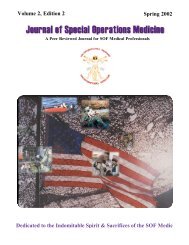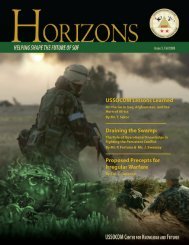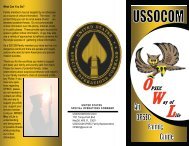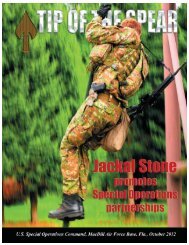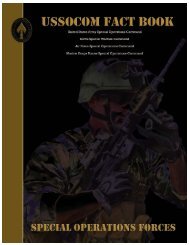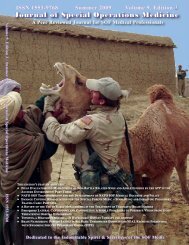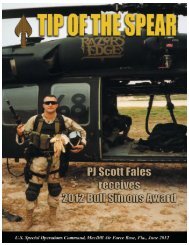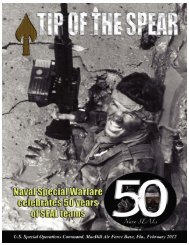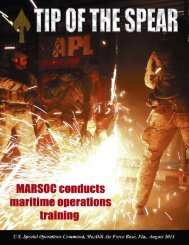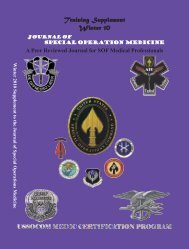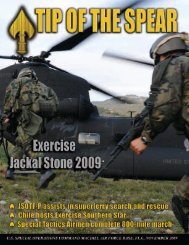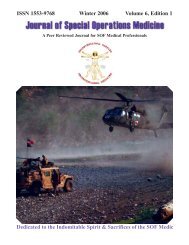December 2010 (6).qxd - United States Special Operations Command
December 2010 (6).qxd - United States Special Operations Command
December 2010 (6).qxd - United States Special Operations Command
You also want an ePaper? Increase the reach of your titles
YUMPU automatically turns print PDFs into web optimized ePapers that Google loves.
working for his father at a local restaurant in his hometown.<br />
After completing high school, he worked with a missionary<br />
group that provided medication to people with malaria. To<br />
work for the group, he had to speak English, Swahili and<br />
Kalenjin, a language most commonly used in Kenya.<br />
“I know that I am going to be an asset if I get picked up<br />
for <strong>Special</strong> Forces,” Kiptum said. “I know the culture and the<br />
people in Africa, and that would help the team while they<br />
have to travel to those countries.”<br />
During their downtime, Soldiers such as Herbst, Kiptum<br />
and others, teach each other different cultures and languages<br />
including Swahili, Polish, Russian and French.<br />
“We try to help each other out and work as a team while<br />
preparing for selection,” Herbst said. “There may be<br />
something that someone else has knowledge on, and could be<br />
beneficial for the rest of us.”<br />
The Selection Process:<br />
When a Soldier comes to the unit and is identified for the<br />
MAVNI Program, he begins in-processing with the<br />
Headquarters Support Company, 3rd Battalion, 10th SFG<br />
(A). He receives his initial Army Physical Fitness Test,<br />
initiates and receives a security clearance, files for a passport<br />
and goes through the command language program to be<br />
certified in languages deemed critical to the U.S. Army.<br />
After in-processing, the Soldier will either stay at the<br />
company to continue training, be utilized at the medical clinic<br />
if he is a medic or is placed on an ODA to receive on-the-job<br />
training.<br />
“We’ve had some great feedback from the teams as they<br />
assess them, and we keep a file on what they are doing,” said<br />
the <strong>Special</strong> Forces captain. “They are being used on<br />
operational deployments in Iraq getting that combat<br />
experience, and in Africa as translators for those foreign<br />
militaries.”<br />
For the Soldiers who stay at the company, they<br />
participate in physical fitness activities each day. Since the<br />
course began, they have spent four weeks undergoing water<br />
survival training, six weeks in land navigation training and<br />
took part in a 10-day <strong>Special</strong> Forces Basic Combat Course –<br />
Support training exercise.<br />
“I didn’t even know how to swim when I got to the unit,”<br />
Kiptum explained. “But they worked with me, starting off in<br />
floatation devices for a couple weeks. By the third week, I<br />
was swimming side-by-side with everyone else in the deep<br />
end.”<br />
Kiptum explained the physical training and critical<br />
training classes have really benefitted and challenged him,<br />
something he feels will better prepare him for the future.<br />
“We have to keep working harder toward our goal,” he<br />
said. “I’m not going to say I am ready right now, when I<br />
know there is still more to learn. I’m going to keep working<br />
hard until the date comes to attend the class.”<br />
In the next few months, the battalion will hold a<br />
“decision-making board” with each Soldier to determine his<br />
needs and what he wants to do in his career.<br />
“Ultimately, the decision is the Soldier’s,” said the<br />
<strong>Special</strong> Forces captain. “We want to educate them on their<br />
options, whether it’s SF, CA, MISO or staying with the unit<br />
and finding other ways to contribute.”<br />
“We are pleased that so many have already shown an<br />
interest in attending SFAS,” the captain said. “There are so<br />
many ways to categorize success, but at the end of the day,<br />
we would like for them to stay in the community and find<br />
other ways to contribute to SOF.”<br />
So far, three Soldiers have expressed desires to attend the<br />
Civil Affairs course, and 15 want to attend SF Selection.<br />
While the others continue to weigh their options, they all<br />
agree the program has been successful thus far.<br />
“This is one of the best programs to be a part of, and we<br />
have yet to reach its fullest potential,” Kiptum said. “We are<br />
just at the beginning; we still face a lot of challenges. One of<br />
the best things is the continued support and guidance from<br />
our leadership.”<br />
A Soldier from 3rd Battalion, 10th SFG (A), receives his<br />
Airborne wings from a <strong>Special</strong> Forces captain during his Basic<br />
Airborne School graduation, July 16, at Fort Benning, Ga.<br />
Nineteen Soldiers from the SOF MAVNI Program have<br />
completed Airborne training. Photo by 1st Sgt. Shawn Sev<br />
Dishman.<br />
Tip of the Spear<br />
17



